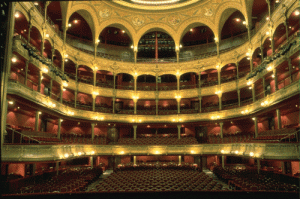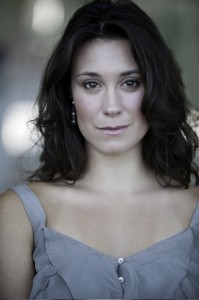 This is a sneak peek into the world of opera and how operaʼs rehearsal process and performances provide great insight to the kind of hard work and dedication it takes to be a full-time performer.
This is a sneak peek into the world of opera and how operaʼs rehearsal process and performances provide great insight to the kind of hard work and dedication it takes to be a full-time performer.
-
Opera -what’s that? Opera is a combination of intense drama and incredibly difficult singing. Think ballet – like the Nutcracker – but with words. Because opera originated in Italy and then spread through Europe over hundreds of years, the majority of opera performed today was written in another language. Opera singers in training are required to learn Italian, French, Spanish, Russian, and German in order to truly understand what we are singing. Some of us have even trained in Europe to further our education.
-
Music from memory. When we start a rehearsal process for an opera, we come to the first rehearsals with the music already memorized. That means that we have prepared ourselves independently of the group. No one is teaching us the music! We all know the piano well enough to teach the music to ourselves. And remember, the languages we are singing in are most likely NOT English which adds a lot more difficulty to the memorization process.
-
No microphones, please! In the beginning of the rehearsal process, we practice with piano accompaniment only. Eventually, an orchestra will join us. Opera is performed live without ANY added amplification. The performance venues, such as opera houses, have excellent acoustics which help to carry the sound. Opera singers sing alone, in duets and trios, and in choruses while being accompanied by a 40+ piece orchestra led by a conductor. All of this without a single microphone.
-
Stage It. In rehearsals, we stage the opera by acting out the story. The stage director is in charge at the rehearsals and is responsible for determining how the singers and characters will move on the stage. We work out the staging in a rehearsal space for a couple of weeks before we rehearse in the performance space.
- Calling all Techies. We usually have a “Tech Week” in the performance space to rehearse prior to opening night. This is the week when all of the technical aspects of the opera are added including lighting, costumes, make-up, wigs, props and sound effects. The performers have the opportunity to get used to the set and rehearse with the orchestra.
- Opera is like football. Performing in an opera is like playing in an NFL game. An opera can last longer than 3 hours, and you can’t call in the subs! Singing a 3 hour opera can take a great deal of athleticism. It can be invigorating but also exhausting. To avoid fatigue, we spread out the performances of an opera with a day or two between each show. The days between performances are called “dark days” and are days for resting our voices and bodies so that we can perform our best.
- Curtains Up. One of the highlights of performing in an opera is when the curtains go up on opening night. Performing in front of a full audience is exciting. The Atlanta Opera performs at the Cobb Energy Center, a large performance venue which seats 2,750 people. And don’t forget – we sing without microphones. The thrill of the applause at the end of each performance is worth all of the hard work and practice.
I hope you enjoyed this sneak peek into the world of opera. Please be sure to visit the Atlanta Opera at www.atlantaopera.org. The Atlanta Opera’s production of La Traviata opens on March 2, 2013, and I hope to see you there!
 Contributed by Kristin Vienneau, Atlanta native mezzo soprano, earned her BMus from New England Conservatory, MMus from Georgia State University, and AD from University of Memphis all in Vocal Performance/Opera Studies. She spent the 2010-2012 seasons with Opera Memphis as an Artist in Residence performing various small roles in addition to making her professional debut as Prince Orlofsky (Die Fledermaus) in January 2012. Most recently, Kristin has been singing with the Atlanta Opera Chorus in their productions of Carmen and La Traviata. Her upcoming opera engagement is with Opera Memphis where she’ll perform the roles of Mother/Allison in a one-act opera called This is the Rill Speaking. Kristin joined the Metro Music Makers team in 2012 as a piano and voice instructor. Contact: kristin@metromusicmakers.com
Contributed by Kristin Vienneau, Atlanta native mezzo soprano, earned her BMus from New England Conservatory, MMus from Georgia State University, and AD from University of Memphis all in Vocal Performance/Opera Studies. She spent the 2010-2012 seasons with Opera Memphis as an Artist in Residence performing various small roles in addition to making her professional debut as Prince Orlofsky (Die Fledermaus) in January 2012. Most recently, Kristin has been singing with the Atlanta Opera Chorus in their productions of Carmen and La Traviata. Her upcoming opera engagement is with Opera Memphis where she’ll perform the roles of Mother/Allison in a one-act opera called This is the Rill Speaking. Kristin joined the Metro Music Makers team in 2012 as a piano and voice instructor. Contact: kristin@metromusicmakers.com
